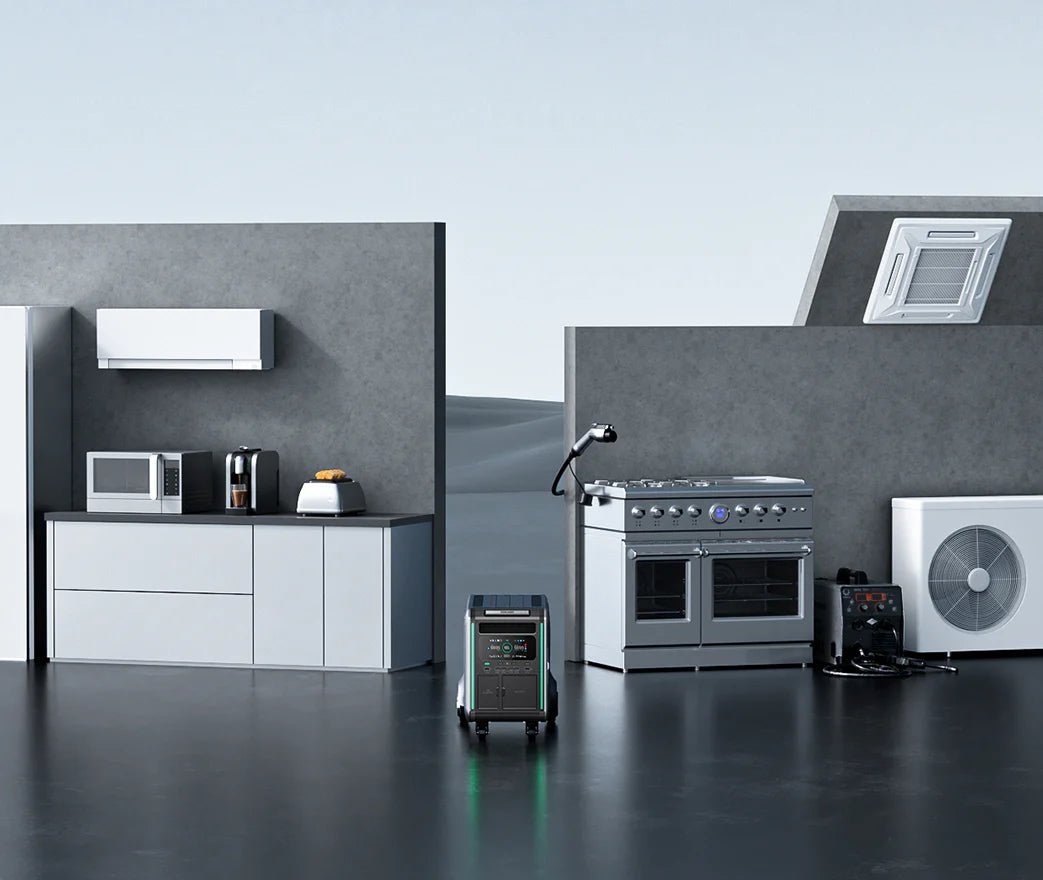
Zendure SuperBase V is the ultimate power station
Eco PoweritShare
The Future of Home Energy Systems
The future of home energy systems is an exciting prospect, but it's not without its challenges. As more homeowners switch from fossil fuels to renewable sources like solar panels, they need a way to store extra energy for later use. For example, if you're using a solar-powered air conditioning unit during peak daylight hours when there is no sun available for collection or if you are relying on wind turbines as the primary source of power during peak gusts that blow through your area at night — both cases will result in wasted energy if it cannot be stored and used at another time. These challenges in what drives new products. Zendure is at the forefront of this industry.
The transition to green energy is on the horizon. However, many of us still rely on fossil fuels to power our lives.
Fossil fuels are a finite resource that will run out eventually, so using them now means we’re taking from future generations. In addition to this, burning fossil fuels releases carbon dioxide into the atmosphere; this contributes to global warming and climate change by raising temperatures around the world and melting polar ice caps (among other things).
The rise of renewable energy like solar panels could help prevent further damage caused by climate change—and as an added bonus—they produce clean energy that doesn’t cause smog or other pollution!
If you want to help save our planet while enjoying lower utility costs and cleaner air at home, consider installing solar panels or another renewable energy system today!
In the future, our homes will be different in form, function, and energy usage. We will have to change how we power them and heat or cool them for a cleaner future.
In the future, our homes will be different in form, function, and energy usage. We will need to be adaptable, knowledgeable and plan for these changes to our energy systems and our homes. We will have to change how we power them and heat or cool them for a cleaner future. To make this successful switch from traditional power sources, we need to change how we power our homes. We'll need to use more renewable energy sources like solar panels and wind turbines. Houses will be built using materials such as plastic instead of wood paneling on walls or metal siding instead of vinyl shutters over windows; those changes alone can reduce heating bills by up to 50%.
While renewable energy systems like wind farms and solar panels are critical pieces of the puzzle, they require equally innovative improvements to our homes if we are to make a successful switch from traditional power sources.
Harnessing the sun and wind is an important part of our plan to save energy. However, for this to work, we will need equally innovative improvements to our homes if we are to make a successful switch from traditional power sources. The best way for us to achieve this is through solar panels and wind turbines that can generate energy on-site.
Energy storage is one key component to making this happen.
Energy storage is one key component to making this happen. Energy storage can be used to store excess energy from renewable sources, such as solar panels and wind turbines. It can also be used to store energy from traditional power sources, so they're ready when you need them.
Energy storage can also help with emergency backup power generation systems in case of blackouts or other emergencies that disrupt the flow of electricity in a home or building. In addition to storing solar-generated electricity during the day for use after dark, batteries could also power LED lights and appliances in case of emergency situations caused by natural disasters like hurricanes or earthquakes; terrorist attacks on nuclear plants; cyberattacks on large utility grids; and other similar events
We have seen advancements in battery technology in recent years that allow for increasingly powerful ways of storing energy for later use. One such example is the Zendure SuperBase V, a portable power station that can serve as a long-term backup option that can run without fail even during extended blackouts and outages.
You've seen the improvements in battery technology, and you want to make sure your home has a power source that will last during a blackout. You want something that's reliable and efficient, but also portable enough to take with you if you need to evacuate.
The Zendure SuperBase V is a powerful, portable battery that can run your house for a week. It has many types of outlets and is dual voltage. So you can charge electronics like laptops, smartphones, tablets and cameras without worrying about compatibility, functionality or running out of juice.
Solar panels and wind turbines collect energy during daylight hours or when the wind blows respectively, but they often don't generate consistent amounts throughout the day. This means that homeowners need a way to store excess energy during peak generation periods for use when their primary power source isn't available or in short supply.
Energy storage is one way to store excess energy for later use. There are many different types of energy storage systems, such as batteries and flywheels. Some examples include lithium-ion batteries, which are used by electric vehicles, flow batteries, which store chemical energy in liquid form; super-capacitors (also known as ultra-capacitors), which can quickly release bursts of electricity to run motors or drive lights; and compressed air energy storage (CAES), in which excess power generated at night is stored as pressurized air that's released when needed during peak hours. The Zendure SuperBase V is a portable power station that can serve as a long-term backup option if the grid goes down.
Conclusion
The future of home energy systems is already here. We are seeing more innovative solutions to traditional problems every day as scientists and engineers work together to find ways to power our lives with cleaner sources. Why not take control and have a look at our complete home systems. While there is still much work left to be done before we can say goodbye entirely to fossil fuels, these advancements will undoubtedly help us get there sooner rather than later.


